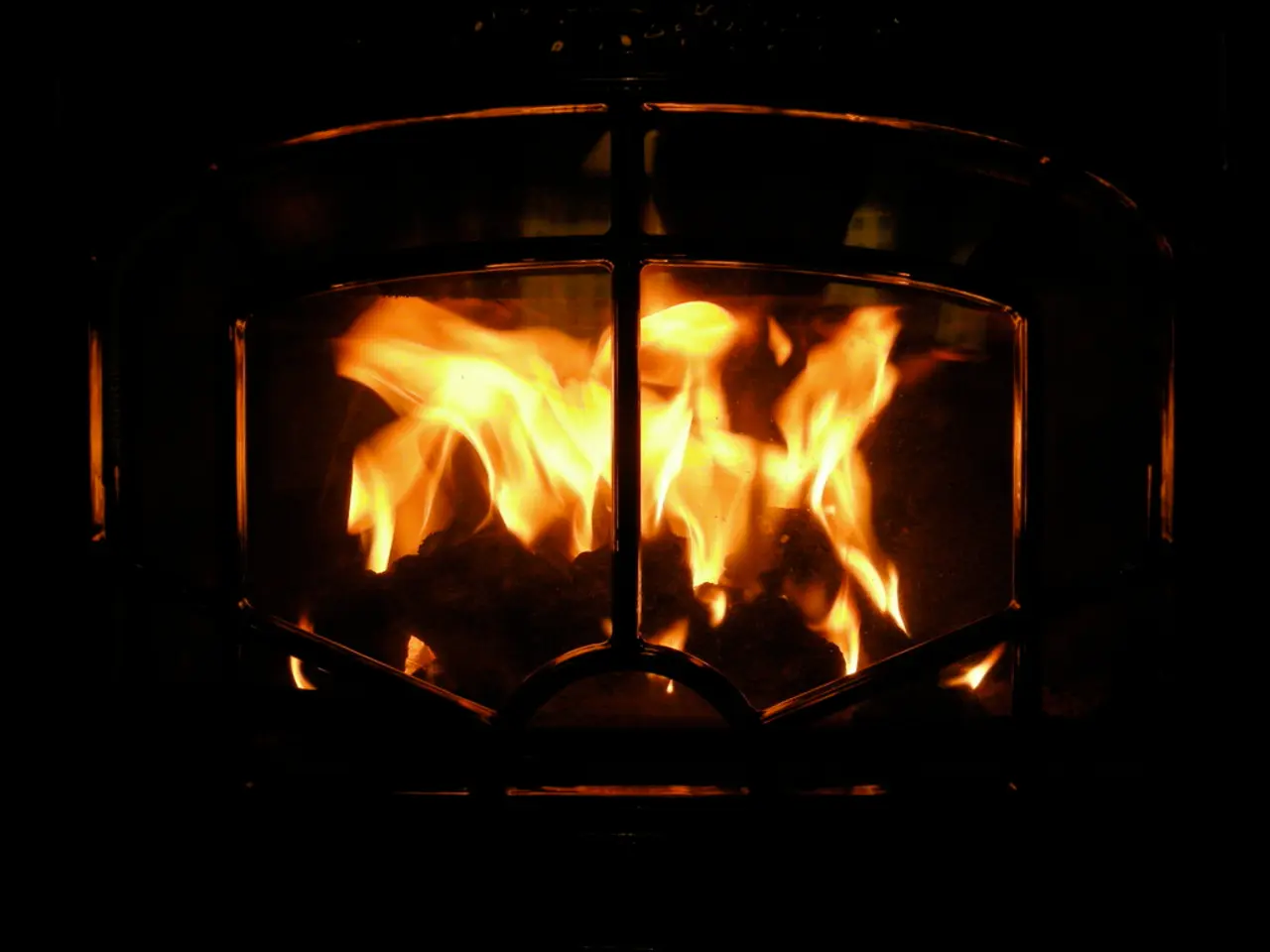Firefighters facing exhaustion during the second day of Portugal's emergency status due to wildfires
In the north of Portugal, a severe wildfire crisis is unfolding. Over the past few days, multiple wildfires have broken out, causing concern for authorities and residents alike.
The latest outbreak occurred in Marinhais, where five fires erupted following a fireworks display. The display was launched earlier than planned, half an hour before the alert came into force, adding to the already volatile situation. The fires were successfully extinguished by the Salvaterra de Magos fire brigade.
The Portuguese Institute for the Sea and Atmosphere (IPMA) has issued a red warning of "extremely high temperatures" for the north of Portugal. As a result, the country is currently in a state of alert due to the high temperatures, which are expected to range between 29°C and 40°C on Monday. Most districts in Portugal have an orange warning for high temperatures.
The fires in Marinhais are not isolated incidents. In the district of Vila Real, at least five active fires are currently raging. Vila Real, known for its rich resources, boasts 364 firefighters and 121 land resources, making it the area with the greatest concentration of resources in Portugal.
Authorities have reported additional arrests linked to arson in nearby areas, indicating ongoing investigations into deliberate fire-setting. A suspect was arrested in Vila Real for suspected arson, and another man was arrested by Portugal's Judiciary Police as the suspected perpetrator of arson responsible for multiple wildfires, including some in the Vila Real district.
Portugal has been experiencing a severe wildfire season in 2025, with over 41,000 hectares burned nationwide and a significant portion of fires recorded in northern districts. The fires in Sirarelhos (in the municipality of Chaves) are not in the final stages and the flames are raging in three different parishes: Pena, Quintã, and Vila Cova. The fires in Ponto da Barca and Celorico de Bastos, also in the north of Portugal, are also concentrating more resources.
Alexandre Favaios, the mayor of Vila Real, stated that firefighters are particularly exhausted and fresh resources are needed. More than 1600 firefighters are on the ground in Portugal, battling the flames of these wildfires.
The local mayor of Vila Real described the wildfires affecting the municipality as an “attack on the territory,” highlighting the severity and suspected human involvement behind the fires. This underscores the continued concern over arson contributing substantially to Portugal’s wildfire crisis this year.
As the situation continues to evolve, authorities and firefighters remain vigilant, working tirelessly to contain the wildfires and protect the affected communities. The launching of fireworks is restricted during the state of alert, and the public is urged to adhere to these regulations to help prevent further outbreaks.
- The ongoing wildfire crisis in the north of Portugal is a significant concern for both authorities and residents, showcasing the critical importance of science to understand and address such environmental-science issues.
- Medical-conditions, such as respiratory problems, become a serious concern during wildfire crises as they can exacerbate existing health issues for affected individuals.
- The fitness-and-exercise industry encourages citizens to prioritize their health-and-wellness, recommending physical activity as a means to boost the immune system, especially during times of increased environmental hazards.
- Climate change is a contributing factor to the escalating wildfire season in Portugal and elsewhere, impacting the health-and-wellness of millions globally.
- To combat climate change, the industry is investing heavily in renewable energies like wind and solar power, reducing pollution and mitigating the adverse effects of environmental-science factors on public health.
- In addition, the retail sector has become increasingly aware of its environmental footprint and is adopting sustainable practices, such as energy-efficient stores, private transportation alternatives, and the promotion of outdoor-living products.
- Public-transit systems play a crucial role in reducing carbon emissions, making them an essential component of any comprehensive climate-change solution and addressing health-and-wellness concerns.
- Transportation and logistics companies are also taking steps to reduce their carbon footprint by utilizing cleaner technologies, such as electric vehicles, and adjusting their routing to minimize emissions.
- Lifestyle choices, including diet, entertainment, and recreation, have a significant impact on individual carbon emissions and contributing to climate change and its ramifications, including extreme weather events like these wildfires.
- Outdoor living and gardening are essential components of a sustainable lifestyle, as they encourage a stronger connection with nature, promote sustainable practices, and contribute to personal-finance savings through reduced energy consumption.
- Data-and-cloud-computing technologies are essential in the fight against climate change, enabling scientists to monitor pollution levels, track global warming trends, and develop more effective climate-change mitigation strategies.
- Investing in technology-driven solutions, such as green buildings, smart grids, and innovative transportation systems, is critical to reducing carbon emissions and promoting a sustainable lifestyle.
- Real-estate developers are increasingly incorporating environmentally friendly design practices, such as green roofs, solar panels, and energy-efficient appliances, to reduce carbon emissions and create more sustainable communities.
- The financial sector plays a critical role in supporting the transition to a sustainable and low-carbon economy, offering green finance solutions and incentives to encourage environmentally friendly practices across various industries.
- European leagues like football and soccer, with their global popularity and significant fan bases, can leverage their influence to promote awareness and drive action on critical environmental issues, such as climate change and deforestation.
- Businesses, governments, and individuals must work together to address climate change and its ramifications, such as habitat destruction, extinction of species, and increased incidence of extreme weather events like wildfires.
- Travelers are becoming more environmentally conscious, opting for eco-friendly accommodation, sustainable transportation, and responsible wildlife tourism, contributing to the preservation of ecosystems and the fight against climate change.




